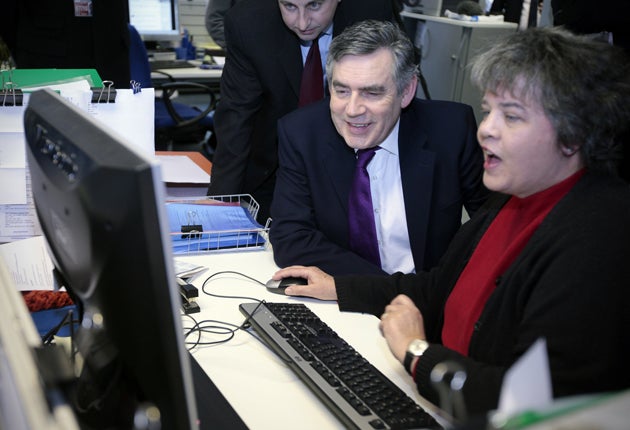Explain U-turn on aid budget, No 10 told
Downing Street attempt to quell Whitehall row over Haiti quake charity single

Your support helps us to tell the story
From reproductive rights to climate change to Big Tech, The Independent is on the ground when the story is developing. Whether it's investigating the financials of Elon Musk's pro-Trump PAC or producing our latest documentary, 'The A Word', which shines a light on the American women fighting for reproductive rights, we know how important it is to parse out the facts from the messaging.
At such a critical moment in US history, we need reporters on the ground. Your donation allows us to keep sending journalists to speak to both sides of the story.
The Independent is trusted by Americans across the entire political spectrum. And unlike many other quality news outlets, we choose not to lock Americans out of our reporting and analysis with paywalls. We believe quality journalism should be available to everyone, paid for by those who can afford it.
Your support makes all the difference.Gordon Brown has been challenged to explain why the Treasury tried to claw back hundreds of thousands of pounds from overseas aid money despite his promise to waive tax on a charity record for Haiti's earthquake victims.
After the disaster on the Caribbean island nation three months ago, which killed an estimated 230,000 people, a celebrity cover version of REM's "Everybody Hurts" was produced, with the Prime Minister announcing that he had decided to waive VAT on the single.
However, as The Independent revealed yesterday, a furious Whitehall row erupted when officials at the Department for International Development (DfID) were told that the Treasury was going to make them find the lost revenue by taking it from other (non-Haiti) aid projects. Sources at both departments confirmed the plan.
Aid groups were also outraged, worried about the implications for field projects on the ground, and pointed out that the public would not have expected their generosity to impact negatively on other aid projects.
Downing Street subsequently denied that this had been the plan and, following this newspaper's report, announced yesterday that no aid projects would suffer. No 10 said that DfID would initially foot the bill for the lost VAT – and that the Treasury will now have to refund it.
But in a letter to the Prime Minister yesterday, the shadow International Development Secretary, Andrew Mitchell, asked: "If there was never any intention for DfID to foot the bill for the VAT, why did the initial payment come from their budget? Why was the money not paid directly from the Treasury to the charity?"
He also demanded to know if the decision about who paid the waived VAT bill was altered after the Prime Minister learnt of The Independent's report, and if he had subsequently ordered the Treasury to pay up.
A Downing Street spokesman said yesterday: "No money raised for Haiti will be deducted from other projects or the DfID budget. DfID will reimburse the initial cost of the VAT for the single but has a written agreement with the Treasury that they will provide additional funds to offset this cost.
"This will be done in the form of additional end-of-year financing flexibility."
A DfID source had described Treasury behaviour as "a bloody cheek". The Treasury collected VAT from sales of the single, while DfID was told to reimburse the charity an equivalent amount.
The single was masterminded by Simon Cowell and sold more than 600,000 copies. Profits were split between the Disasters Emergency Committee and The Sun newspaper's Helping Haiti campaign. Cheryl Cole and Robbie Williams were among the performers who participated for free.
There has been some controversy over whether Britain should have sent a high-level observer to the island after the quake. The EU trade commissioner, Karel de Gucht, visited the islands within days of the disaster, closely followed by Hillary Clinton and France's President Nicolas Sakozy.
But the Foreign Office and DfID took the view – supported by the aid community – that the islands needed doctors and aid workers rather than political visitors. When Prince Harry offered to visit the island soon after the disaster, he was advised by civil servants not to.
Andrew Mitchell received a written invitation from the International rescue Commission in February, but cancelled the trip at the last moment after he was warned in writing by the Foreign Office that staff at the British embassy in Haiti had been told to concentrate on relief work rather than prioritise shepherding him about.
Mike Foster, the junior minister at DfID, eventually visited the island last month. While he was there, he announced that Britain's total contribution to the relief operation had reached £150m – £91m donated by the public, and £59m from the Government.
A UN donors conference in New York this week saw countries and NGOs pledge to raise $10bn (£6.5bn) to aid Haiti's reconstruction over the next three years, although such promises do not always materialise in full.
Join our commenting forum
Join thought-provoking conversations, follow other Independent readers and see their replies
Comments